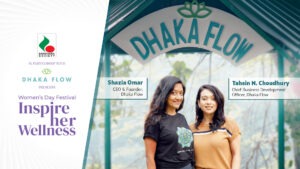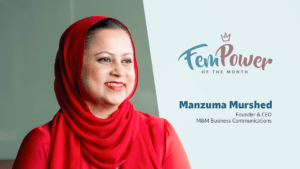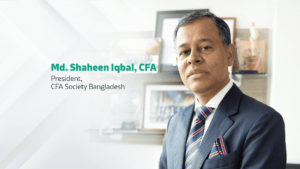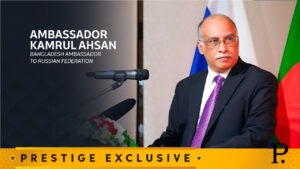Q. Tell us in brief about your early days and your academic journey. How did you end up stepping into the Journalism sector?
My early childhood was spent in the Green Road area, It was the neighborhood I was born in. I am the second youngest of three brothers. My father worked for a government organization, while my mother was a housewife.
Speaking of my educational journey, I completed my SSC from BN School in 1990 and my HSC from Hermann Gmeiner College in 1992. After pursuing my undergraduate and graduate degrees in journalism from Dhaka University, I obtained a second master’s degree in journalism at the University of Westminster in England. Even though this is where my formal academic journey ends, I continue to learn from all sources.
My career started back in 1998 as a research officer for the Bangladesh Centre for Development, Journalism, and Communication (BCDJC) and soon after that, I started working for Prothom Alo. While working there, I sat for the BCS exam. In 2001, I joined as an Assistant Commissioner and Magistrate. However, it was not enjoyable for me despite having such a prestigious position, which led me back to Prothom Alo again. Later I began working for BDnews24.com as a News Editor in 2006. Later, followed by working in the PR and media department at Warid telecom. In addition, I worked as a consultant for the World Bank for a short period. Gradually, I shifted to other organizations, which were ‘Kagoj’ – a weekly newspaper, another weekly ‘Media Watch,’ and Daily’ Amader Orthoniti,’ operating as the Editor.
Starting my journey with “Independent Television” I took my initial steps in the broadcast and media sector. It was my first position in the broadcast and media sector, which provided me with some of the most memorable experiences of my professional life, and helped me to learn extensively. In 2019, I left Independent Television to work for Deutsche Welle, an international broadcaster based in Germany, to lead their Bangla Division.
I’ve been blessed with an amazing family and living peacefully with my wife and my daughter.

Q. What inspired you to become a Journalist? Was it out of passion, or it just happened simply over time?
I’ve always aspired to become a Lawyer and was preparing to sit for the admission exam in Dhaka. Even after obtaining good marks, due to some constraints, I could not choose Law as my subject of study. Therefore journalism was the option that felt like a suitable alternative for me. Still, at that time, I was unsure of my fate and kept studying at full pace.
After graduating with a First Class, I was offered the chance to join the faculty. However, being curious to learn more about the field of journalism, I wanted to delve deeper into it. I made every effort to be the best at every facet explored.



Q. How did the show Ajker Bangladesh start, and what went behind its initiation?
I had the opportunity to join television or broadcasting media from the early days of my career. However, being a camera-shy person, it was somewhat of a struggle for me. Therefore, my intention in general was to avoid it. I led the entire process and team behind the camera in my initial time working for Independent television as a Chief News Editor and later as Head of News, where Front-of-camera presence was not required. At the time, I proposed renaming the program from “Raat 9 Tar Bangladesh” to “Ajker Bangladesh.” Because of the sensitivity of the content, the Managing Editor back then of Independent Television, who is now the CEO, insisted that I would be the best person to take the show’s lead from the front. Agreeing to take over the show, I insisted on having a full-fledged research team because it requires a lot of timely access to updated information. Furthermore, it involved political discussions, making information accuracy crucial. We began in October 2011, and by 2012, we had attained enormous fame and reach.
We were very research-oriented, which was one of the principal elements in its quick success. My natural facial expressions and emotions were also a result of the fact that I disliked acting fake in front of the camera. I preferred to remain impartial, not pick sides, and pay no attention to any positive or negative feedback. The general public became quite engrossed in it. Independent Television deserves a lot of credit for creating such a strong research team and giving me the opportunity.

Q. Being the mastermind of one of the most successful shows in Bangladesh and now representing at an international level, what changes do you see now in the media industry compared to the past?
Working in the media and journalism sector since 1993, I have made it a point to research and comprehend how the human mind works. I attempt to read their thoughts in various scenarios, which to me is fascinating. In my initial days of working in the media, it was very difficult to predict who would watch our content on television or in the newspaper. The content needed to be edited so that a young person could understand it while also having an adult understand it. Therefore, the targeted audience was much more ambiguous back then than it is now, which is not the case. Due to technological advancements, the current state of affairs has brought about a significant change in the media industry. Now that content producers are aware of their audience, they can tailor their work to specific demographics, such as age or gender. To reach a wider audience, even broadcasters and television networks are posting their clips on social media.
Compared to earlier times, there have been significant changes in the type of message and how content is delivered. Before, I believed I should serve as the general public’s ombudsman. It is my responsibility to bring any issues they may be having to the front and find solutions. But these days, news about it appears on social media whenever a problem occurs, and solutions are found very quickly. Previously when Farmers encountered various difficulties regarding crop production, the media would inform them of any calamities or disasters. However, they can now instantly find every piece of news on the internet. People used to rely on journalists and the media when it came to news and events, but now they can find everything online. Most people now use social media or other platforms to share their opinions because they know what to say, how to say it, and when to say it in front of the media. The scenarios are changing, but I’m unsure how much has changed or where the media industry will go. I’m still looking forward to trying to understand it, only time will tell.



Q. Since Facebook Journalism and bitesize news is gaining traction, what impact do you think it might make in the media industry?
Sincerely, I ponder whether the general public is even curious to know the headlines or synopsis. They hardly ever pay attention to important issues and instead place more emphasis on hot topics or recent news. The Political and Entertainment sections receive the most focus. Anything having to do with improving the general populace or the nation’s development is largely ignored unless something new and trendy is emerging in this area.
I’m not sure whether Facebook journalism even qualifies as journalism. Anything that’s not cross-checked with multiple sources and presented with authenticity is not journalism.
Nowadays, there is a lot of news on social media, and while the general public acts as though they believe it, some may not. Since something other than the news is typically the main motivation for its delivery, there is usually a lack of authenticity when news is presented on social media. Tomorrow, anyone can start a YouTube channel and criticize a significant figure. Although the public may not know the full scope or weight of your criticism, they would most likely applaud the fact that you made it. What more would you require if that made your journalism famous?
The current news platforms always have a negative attitude toward new ones that are introduced. This was when online news sources were launched and criticized by newspapers and television networks. I have no idea how long or how far this social media journalism would go; my assumptions can be wrong. However, as soon as I learn about any news on social media, I look for additional sources to confirm its veracity. Despite being influenced by outside parties, the mainstream media in our nation is currently forced to present some specific news due to pressure from social media, but that situation only exists in Bangladesh. According to my observation, no other mainstream media worldwide is under any pressure from social media platforms to curate their news.

Q. In terms of a moral standpoint, there’s competition now between Media trials and Social Media trials. What role can the media play in tackling this situation?
The media has been taking part in media trials since its inception. A famous proverb in western countries states that “an honest judge will look at the laws before declaring the verdict, whereas a dishonest judge would look at the press before announcing the verdict”. This adage has been around for more than a century.
Any wrongdoings were judged even before the media emerged. Its introduction doesn’t significantly alter the situation. Although it may seem a little inappropriate to say, a particular political group controls the media. The media needs to demonstrate that it is working for the general public, so it can’t go too far against popular opinion. It primarily benefits the group in power and advantageously serves the public. You see, the football players in our country don’t appear much in front of the media because they don’t have enough power or influence. Since cricket is in a strong position, the media is heavily engaged with cricket.
The goal and dream of the media is to strengthen the position of the ruling class. The media never challenges tradition; rather, it always adheres to it without question. Even though they claim it, the media never sets trends. They would prefer to follow current trends and heavily adapt to them.
In other words, the media is just a tool used by the powerful and those in positions of influence to strengthen their positions and gain long-term advantages. That is how it is now and always has been.

Q. There’s a growing uncertainty or confusion among the students regarding their careers, which creates a group that goes abroad and another going into BCS. Why do you think such a situation occurs?
Even though it is receiving a lot of attention right now, this situation existed long before. Back then, jobs in the government or the BCS were very alluring, but for most people, they remained a pipe dream. It was unusual to find one BCS officer from a total of 10 villages. It didn’t seem like many people were doing this because there were so few of them, but it was everyone’s ideal career. Opportunities for government jobs increased when officers retired in 1998, 1999, and 2000. Currently, 3300 officers are recruited, compared to only 400 in the previous five years. When you see a lot of these officers, you start to notice the advantages, such as the fact that you can take bribes if you want and that no one can fire you. Private employment, on the other hand, is very challenging and has no assurance of sustainability.
Consequently, a career objective is established. For instance, given their age, my batch mates are now Joint Secretaries, which is a fairly important position. I don’t see myself as the Joint Secretary, and even if there were a million Khaled Mohiuddins, I still wouldn’t see one of them serving this position. For me, it was never the desired position. However, due to the influence it has, it is desirable to many. You’ll have power only if you misuse your position and the power to take bribes. Another benefit is not getting fired. If you’re not contributing to your company and the company wants to fire you, but they can’t, is that considered job security?
With those advantages in mind, it becomes problematic if you are drawn to these government jobs because there isn’t a clear or convincing reason why you want that job.
The real question ought to be whether this position is respected. Are you able to improve it? Can you serve the nation? But nobody is interested in those questions. I sincerely hope that the youth of today will consider their goals and perspectives on work and life. You can dream of having a lot of money; people will respect you, and you’ll go from one country to another, and to achieve that, you’re willing to do whatever it takes. That can be one’s personal choice, but I feel that that’s not the actual gain in life. Our parents and family are one of the main reasons for this kind of mind mapping.
Parents always want the best for their children, so they frequently push them to lead better lives by pressuring them to pursue more challenging careers. Their imagination is limited to that, so they need to expand it to see the bigger picture. Children shouldn’t be taught about such a way of life, and they should be urged to choose actions that improve life overall.

Q. There’s a growing number of startups being established in our country, but a lot of entrepreneurs give up in the middle of their journey. What would be your opinion regarding this matter?
First off, I’d like to say that Bangladesh is doing an outstanding job in terms of startup formation. It’s obvious that life isn’t always a bed of roses, and it takes a ton of hard work to start something from scratch and see it through to success. In addition, patience must be maintained at all times. As a result, commitment is also a factor. Due to a lack of patience, I’ve seen a lot of entrepreneurs in our nation abandon what they’ve created. Life is like a soccer match. You outsmart and dribble past ten opponents, but if you tire and let the ball go, that’s the end for you. You must set up the goal, take the shot, and score. You must complete it if you want to change the outcome in that way.
The young people need to realize that nothing is going to magically appear and give them anything for free; they have to work for it. Luck does not exist; only hard work and dedication do. The large group of businesses we see today didn’t come into existence in a few quick steps; it took years of arduous work. It is difficult to be an entrepreneur, and many sacrifices must be made. Reaching the top requires overcoming obstacles. Every entrepreneur has faced challenges in their lives, but take a look at what they have accomplished through perseverance, hard work, and dedication. This all can be learned from history.
Impulsiveness in youth is necessary if we are to break free of the antiquated system and introduce fresh ideas. Impulsive youth will defy accepted norms and create better outcomes from the pieces they leave behind. To complete their work, they will consider their options. They should be encouraged to try new things and given the assurance that failure is acceptable and that we can afford it. Criticizing their effort in an attempt to demotivate them doesn’t produce satisfactory results.
When we travel abroad, it’s a peculiar habit of Bangladeshis to compare our nation to others. Everyone has a unique set of circumstances, so the argument cannot be justified. We haven’t been able to put in the same amount of effort as other nations. The young people still have a long way to go, but I think they’ll get there eventually.

Q. How do you think our media can adapt and, at the same time, tackle the challenges that come with technological advancement?
The media must adopt new technologies quickly so that their operations are made easier in the future. A backlog in comparison to other regions of the world could result from delaying adaptation. Let me talk about newspapers now because, in terms of technological advancement in the television sector, it is far more advanced and continuously changing.
I can say with confidence that we are on par with other regions of the world in terms of technology in the media sector because I have traveled to numerous nations and visited a variety of newspapers and television companies. Even before my time with Independent Television, our country had more advanced technology than the neighboring countries. The media should pay more attention to the caliber of the content and how it is presented.
We are presenting our news in a manner that is on par with The Guardians on both online and offline platforms. We already had Bdnews24.com introduced to our nation before the arrival of the Guardians. Therefore, technological adaptation is not an issue; instead, we should pay more attention to the originality of the contents.

Q. Having uncompromising moral and ethical values, what would be your advice to today’s youth who want to stay strong in their values and beliefs and go forward in their career?
You must maintain your contentment with your current situation. Your life begins with it, and it is the most crucial. It wasn’t difficult at all for me to get to where I am in life now. The determination of my value is the cause. I wouldn’t object to accepting a certain payment for my work and didn’t feel my entitlement to more. Other channels would offer me the chance to join them when I worked for Independent Television for two or three times my current pay, but I never took them up on the offer. I might have to follow my boss’ orders because I felt I didn’t deserve it and because of the extra pay that was offered.
The true measure of success in life isn’t how much money or possessions you own. The true measure of success in life is not how much money you make but how happy you are and how you live on your own. I always felt satisfied with my work because I put my all into it. I have no regrets because I know my worth, and did my part to do it right.
Young people shouldn’t begrudge themselves anything. They ought to recognize their value and be content with what they have. They ought to exert all of their efforts and maintain their patience. Recognize that while failure is a part of life, it is not the end. I’ve finished last in many races, but I never gave up. The amount of news I’ve released is significantly less than the amount I was unable to release.
Work on your weaknesses, acknowledge your worth, and strive to improve every day.






